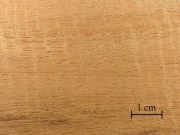Difference between revisions of "Primavera"
Jump to navigation
Jump to search
(username removed) |
|||
| (One intermediate revision by one other user not shown) | |||
| Line 1: | Line 1: | ||
| − | [[File:Prima_vera.jpg|thumb|Primavera | + | [[File:Prima_vera.jpg|thumb|Primavera (''Tabebuia donnell-smitbii'')]] |
| − | |||
| − | (''Tabebuia donnell-smitbii'')]] | ||
== Description == | == Description == | ||
| Line 10: | Line 8: | ||
prima vera; white mahogany | prima vera; white mahogany | ||
| − | + | ==Physical and Chemical Properties== | |
| − | |||
| − | |||
| − | |||
| − | |||
| − | = | + | * Color: Heartwood is pale cream to golden yellow and darkens with age |
| + | * Grain/Texture: Grain is straight to slightly interlocked. Texture is medium with naturally high luster. | ||
| + | * Durability: Somewhat resistant to decay but susceptible to insects. | ||
| + | * Density = 31 ppcf | ||
| + | ==Working Properties== | ||
| + | * Easy to work: probably due to its low density. | ||
| + | * It has a moderate blunting effect on cutting edges, so carbide tools are recommended. | ||
| + | * Tends to split when nailed or screwed, so pilot holes are recommended despite the wood’s softness. | ||
| + | * Turns, glues, stains, and finishes well. | ||
| + | ==Resources and Citations== | ||
| + | * The Wood Database: [https://www.wood-database.com/primavera/ Primavera] | ||
* G.S.Brady, ''Materials Handbook'', McGraw-Hill Book Co., New York, 1971 Comment: p. 432 | * G.S.Brady, ''Materials Handbook'', McGraw-Hill Book Co., New York, 1971 Comment: p. 432 | ||
| Line 24: | Line 28: | ||
* F. H. Titmuss, ''Commercial Timbers of the World'', The Technical Press Ltd., London, 1965 | * F. H. Titmuss, ''Commercial Timbers of the World'', The Technical Press Ltd., London, 1965 | ||
| − | * ''Encyclopedia Britannica'', http://www.britannica.com Comment: "Primavera." | + | * ''Encyclopedia Britannica'', http://www.britannica.com Comment: "Primavera." listed as species Cybistax donnelsmithii (or Donnel-Smithii); Accessed 18 May 2004 . |
[[Category:Materials database]] | [[Category:Materials database]] | ||
Latest revision as of 14:50, 4 August 2022
Description
A pale-color, fine-texture wood obtained from the species Cybistax donnelsmithii trees native to Central America. Primavera wood is light yellow when cut but form pink to brown streaks when exposed to air. Also called white mahogany, primavera is used for furniture, cabinetry, and veneers.
Synonyms and Related Terms
prima vera; white mahogany
Physical and Chemical Properties
- Color: Heartwood is pale cream to golden yellow and darkens with age
- Grain/Texture: Grain is straight to slightly interlocked. Texture is medium with naturally high luster.
- Durability: Somewhat resistant to decay but susceptible to insects.
- Density = 31 ppcf
Working Properties
- Easy to work: probably due to its low density.
- It has a moderate blunting effect on cutting edges, so carbide tools are recommended.
- Tends to split when nailed or screwed, so pilot holes are recommended despite the wood’s softness.
- Turns, glues, stains, and finishes well.
Resources and Citations
- The Wood Database: Primavera
- G.S.Brady, Materials Handbook, McGraw-Hill Book Co., New York, 1971 Comment: p. 432
- Ralph Mayer, A Dictionary of Art Terms and Techniques, Harper and Row Publishers, New York, 1969 (also 1945 printing) Comment: Cyhistax donell-smithii
- F. H. Titmuss, Commercial Timbers of the World, The Technical Press Ltd., London, 1965
- Encyclopedia Britannica, http://www.britannica.com Comment: "Primavera." listed as species Cybistax donnelsmithii (or Donnel-Smithii); Accessed 18 May 2004 .
